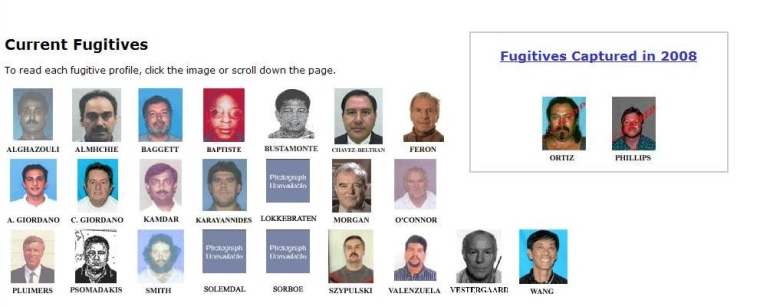The government is starting a different kind of most-wanted list — for environmental fugitives accused of assaulting nature.
These fugitives allegedly smuggled chemicals that eat away the Earth's protective ozone layer, dumped hazardous waste into oceans and rivers and trafficked in polluting cars.
And now the government wants help in tracking them down.
In its own version of the FBI most-wanted list, and the first to focus on environmental crimes, the Environmental Protection Agency on Wednesday unveiled a roster of 23 fugitives, complete with mug shots and descriptions of the charges on its Web site at http://www.epa.gov/fugitives.
A top EPA enforcement official said the people on the list represent the "brazen universe of people that are evading the law." Many face years in prison and some charges could result in hundreds of thousands of dollars in fines.
Charged but on the run
"They are charged with environmental crimes and they should be brought before the criminal justice system and have their day in court," said Pete Rosenberg, a director in the agency's criminal enforcement division.
Those listed include:
- Mauro Valenzuela, who in 1996 is alleged to have illegally transported hazardous waste oxygen generators onboard ValuJet flight 592 without proper markings and other safety measures. The jet crashed, killing all 110 passengers and crew onboard. Valenzuela failed to appear in federal court nine years ago.
- John Karayannides, who allegedly helped orchestrate the dumping of 487 tons of wheat tainted with diesel fuel into the South China Sea in 1998. Karayannides is believed to have fled to Athens, Greece.
- The father and son team of Carlos and Allesandro Giordano, who were arrested in 2003 as the owners of Autodelta USA, a company that was illegally importing and selling Alfa Romeos that did not meet U.S. emission or safety standards. The two men are believed to be hiding out in Italy.
- Raul Chavez-Beltran, who ran an environmental cleanup company in El Paso, Texas, that is accused of transporting hazardous waste from factories along the Mexican border and improperly disposing and storing it in the U.S. In one case, he allegedly stockpiled mercury-laced soil from an environmental spill in a warehouse.
The Web site also lists captured fugitives, among them David Allen Phillips, who escaped prison in 2005 after being convicted of Clean Water Act crimes in Montana. He fled to Mexico, was turned over by Mexico last March and now awaits further sentencing.
David Ortiz fled after appealing of his conviction for Clean Water Act crimes in 2004. He was captured last March in Colorado and is currently in prison.
Will it matter?
The launch of the most-wanted list comes as EPA's criminal enforcement has ebbed. In fiscal 2008, the EPA opened 319 criminal enforcement cases, down from 425 in fiscal 2004. And criminal prosecutors charged only 176 defendants with environmental crimes, the fewest in five years.
EPA officials defend the agency's record, saying the agency has focused on bigger cases with larger environmental benefits.
But Walter D. James III, an environmental attorney based in Grapevine, Texas, says the EPA is critically understaffed to investigate environmental crimes. While the budget for the division has increased by $11 million since 2000, there are only 135 criminal investigators, far fewer than the 200 Congress authorized in 1990.
James said that while the list could prompt the public to turn people in, he questioned whether it would deter others from committing environmental crimes.
"It's like telling John Gotti he is a bad man," James said. "Is that going to matter to John Gotti?"
